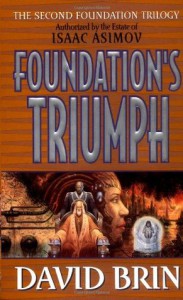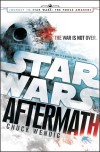SPOILER ALERT!
Foundation's Triumph
 One of the creepiest stories I ever read was The Humanoids by Jack Williamson. In it, alien robots come to Earth to keep humans safe. That's their main motivation. But what starts off as safety turns into tyranny when the robots see cooking, crafting, and driving as being harmful; we could harm ourselves from burning and cutting, or worse, if we got into an accident. Now that I've finished the entire Second Foundation series, I see that these novels (and possibly all of Asimov's series) are equally horrifying, for the same reasons.
One of the creepiest stories I ever read was The Humanoids by Jack Williamson. In it, alien robots come to Earth to keep humans safe. That's their main motivation. But what starts off as safety turns into tyranny when the robots see cooking, crafting, and driving as being harmful; we could harm ourselves from burning and cutting, or worse, if we got into an accident. Now that I've finished the entire Second Foundation series, I see that these novels (and possibly all of Asimov's series) are equally horrifying, for the same reasons.The core theme of the trilogy is one of chaos, or, more specifically, preventing it. The thing is, in the world of Foundation, chaos is synonymous with independence. Hari frets over the Renaissance worlds, planets where ingenuity and creativity thrive, ultimately leading to riots, rebellions, and destruction, and wonders how to fit them into his plan. These worlds are few, but critical, and as the series progresses, it turns out that the reason these worlds have this chaos is because these are the worlds that were not terraformed by robots. As a result, the planets had civilization develop independently of robot machinations, meaning that these planets didn't have a huge satellite orbiting them to suppress independent thought.
To be fair, it's not that the satellites suppress all thoughts, but they do suppress thinking about robots, or the technologies that would create them, or allow for creativity at all, as far as I understand it. But between those satellites and the brain fever that strikes anyone of intelligence around the time of puberty, effectively dumbing them down a bit so they can't reach the true potential of their intelligence, certainly suggests that the robots aren't averse in experimenting with widespread thought control.
In the afterword to this novel, Brin mentions that he and the other two authors in this trilogy saw that there were seeds planted in Asimov's series that suggested the idea of chaos being the elephant in the room throughout the entire story. I don't know that I agree, but when you look at the main premise of the series and psychohistory -- the idea that one can control a civilization through mathematical theories -- chaos would certainly throw a wrench into those calculations. Anything unpredictable would affect that control, so removing chaos would, in turn, ensure more control in the equations.
The main problem with the theme, for me, is that I don't agree that it's worth giving up independence in order to protect people. There's the saying that one can have freedom or safety, but not both, and the theme of this trilogy reflects that. There's a moment where Brin discusses the time when two robots decided to alter the entire future course of humanity without consulting anyone else, and you can almost detect the idea that this was a bad thing. But the results were that humanity finally left Earth to conquer the stars, and that it was the right thing to do, so the ends justified the means. The fact that this trilogy suggests that the entire course of human history from that point forward was controlled by the robots, though, felt more horrifying than reassuring. Given that Asimov's original stories feel more positive, it's hard to imagine that these novels really fit in with the original series. In fact, this whole trilogy winds up having a very conservative, patriotic angle that leaves me uncomfortable.
I still feel like these three books are all better written than Asimov's books are, but thematically, Asimov's are certainly the better option. I guess how much you like the trilogy will depend on how much you like the original series, too, and (possibly) what your political leanings are. It's just unfortunate that three well-told stories can devolve into a message that's more horrifying than uplifting.






